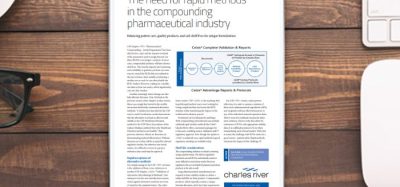First participants dosed with pan-antiviral nasal spray in Phase IIa trial
Posted: 16 March 2022 | Hannah Balfour (European Pharmaceutical Review) | No comments yet
The Phase IIa influenza-challenge study will enrol 123 healthy adults and support the development of INNA-051 as a pan-antiviral nasal spray.


The first participants have been dosed with INNA-051, a first-in-class broad-spectrum antiviral innate immunomodulator being developed for pre- and post-exposure prophylaxis of respiratory viral infections in populations at risk of complications, in a Phase IIa influenza-challenge study, announced drug developer ENA Respiratory.
The single centre, prospective, randomised, double-blind, placebo-controlled study will enrol up to 123 healthy adults in the UK to investigate the safety, tolerability and antiviral efficacy of two dose levels of INNA-051, administered as an intranasal spray, against H3N2 influenza virus infection. Efficacy is being assessed as the reduction of total viral load by RT-qPCR and total symptoms score in treated versus placebo participants.
This human influenza challenge pre-exposure prophylaxis study will supports the development of INNA-051 for pan-antiviral use in those at high-risk of complications from Severe Acute Respiratory Syndrome coronavirus 2 (SARS-CoV-2; the virus that causes COVID-19), rhinovirus, respiratory syncytial virus (RSV), influenza and other common respiratory viruses. Results are expected by the end of 2022.
“Patients at high-risk of complications from a respiratory viral infection, such as the elderly and those with pre-existing lung, cardiovascular, liver and kidney chronic diseases, urgently need therapies that help the body respond faster and reduce the risk of hospitalisation or complications. This study will take us another step closer to determining whether INNA-051 can provide a fast-acting, easy-to-use therapy to address this unmet need,” commented Dr Christophe Demaison, co-founder and CEO of ENA Respiratory.
A Phase II COVID-19 post-exposure antiviral prophylaxis study to determine whether INNA-051 reduces the incidence and severity of symptomatic COVID-19 is also expected to begin shortly. The study also will evaluate whether the nasal spray reduces the magnitude and duration of SARS-CoV-2 nasal shedding, to understand potential broader public health benefits. INNA-051 was found to be well-tolerated in a Phase I study, and complete Phase I results are expected soon.
About INNA-051
INNA-051 is an innate immune toll-like receptor 2/6 (TLR2/6) agonist. It is being developed for intranasal delivery to target the primary entry site of viral respiratory infections as most respiratory viruses, including SARS-CoV-2 and influenza, initially infect and replicate in nasal mucosa epithelial cells. Fast-acting and inducing a durable biologic response supporting weekly administration, INNA-051 works by recruiting innate immune cells and priming epithelial cells of the nasal mucosa to respond more quickly to infections, rapidly eliminating viruses and other pathogens before they spread throughout the body. INNA-051 and close analogues have been shown in pre-clinical studies to be effective against multiple respiratory viruses, including SARS-CoV-2, influenza (H1N1 and seasonal H3N2), and rhinovirus.
Related topics
Clinical Development, Clinical Trials, Drug Development, Drug Targets, Research & Development (R&D), Respiratory Drug Delivery (RDD), Therapeutics, Viruses
Related organisations
Related drugs
Related people
Related diseases & conditions
Coronavirus, Covid-19, Influenza, respiratory syncytial virus (RSV), Rhinovirus









